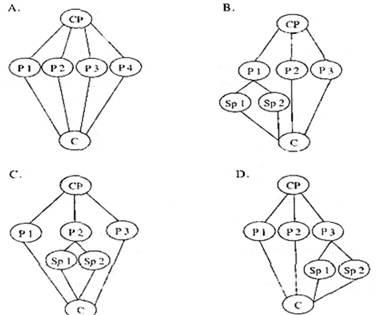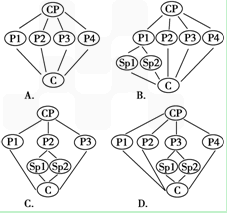题目内容
They ________ in spite of the extremely difficult conditions.
A. carried out B. carried off C. carried on D. carried forward
C
动词词组辨析。carry out“执行,实施”,carry off “赢得某物或成功地应付局面”,carry on“继续做某事”,carry forward“结转”。根据句义,应填C。

How Room Designs Affect Our Work and Feelings
Architects have long had the feeling that the places we live in can affect our thoughts, feelings and behaviors. But now scientists are giving this feeling an empirical(经验的,实证的) basis. They are discovering how to design spaces that promote creativity, keep people focused and lead to relaxation.
Researches show that aspects of the physical environment can influence creativity. In 2007, Joan Meyers-Levy at the University of Minnesota, reported that the height of a room's ceiling affects how people think. Her research indicates that higher ceilings encourage people to think more freely, which may lead them to make more abstract connections. Low ceilings, on the other hand, may inspire a more detailed outlook.
In additions to ceiling height, the view afforded by a building may influence an occupant's ability to concentrate. Nancy Wells and her colleagues at Cornell University found in their study that kids who experienced the greatest increase in greenness as a result of a family move made the most gains on a standard test of attention.
Using nature to improve focus of attention ought to pay off academically, and it seems to, according to a study led by C. Kenneth Tanner, head of the School Design & Planning Laboratory at the University of Georgia. Tanner and his team found that students in classrooms with unblocked views of at least 50 feet outside the window had higher scores on tests of vocabulary, language arts and maths than did students whose classrooms primarily overlooked roads and parking lots.
Recent study on room lighting design suggests than dim(暗淡的) light helps people to loosen up. If that is true generally, keeping the light low during dinner or at parties could increase relaxation. Researchers of Harvard Medical School also discovered that furniture with rounded edges could help visitors relax.
So far scientists have focused mainly on public buildings. "We have a very limited number of studies, so we're almost looking at the problem through a straw(吸管)," architect David Allison says. "How do you take answers to very specific questions and make broad, generalized use of them? That's what we're all struggling with."
【小题1】What does Joan Meyers-Levy focus on in her research?
| A.Light. | B.Ceilings. | C.Windows. | D.Furniture. |
| A.the shape of furniture may affect people's feelings |
| B.lower ceilings may help improve students' creativity |
| C.children in a dim classroom may improve their grades |
| D.students in rooms with unblocked views may feel relaxed |
| A.the problem is not approached step by step |
| B.the researches so far have faults in themselves |
| C.the problem is too difficult for researchers to detect |
| D.research in this area is not enough to make generalized patterns |
CP: Central Point P: Point SP: Sub-point(次要点) C: Conclusion

Generic Name: ASPIRIN
Pronunciation: ['æsp?rin]
Why it is prescribed (开药方):
1. Aspirin relieves mild to moderate pain.
2. It reduces fever, redness, and swelling.
3. It prevents blood from clotting (凝结).
When it is to be taken:
1. Aspirin is often taken without a prescription.
2. Follow the instructions on the label and package.
3. If your doctor prescribes aspirin for you, you will receive specific instructions for how often you should take it.
4. Keep in touch with your doctor.
How it should be taken:
1. Aspirin comes in the form of suppositories (栓剂), capsules, and regular, coated, extended-release, and chewable tablets.
2. Regular, coated, and extended-release aspirin tablets and capsules should be swallowed with a full glass of water or milk after meals to avoid stomach upset.
3. Chewable aspirin tablets may be chewed, crushed, dissolved in a liquid, or swallowed whole; a full glass of water, milk, or fruit juice should be drunk immediately after taking these tablets.
Special Instruction:
1. Children should not take aspirin for fevers associated with flu or chickenpox (水痘) because such use has been linked with a serious illness known as Reye’s syndrome.
2. Adults should not take aspirin for pain for more than 10 days (five days for children) without consulting a doctor.
3. Aspirin should not be taken by adults or children for high fever, fever lasting longer than three days without a doctor’s supervision (监管).
4. Do not give more than five doses (剂量) to a child in a 24-hour period unless directed to do so by a doctor.
5. If you miss a dose, take the missed dose as soon as you remember it and resume the prescribed schedule.
Side Effects:
1. Although side effects from aspirin are not common, they can occur.
2. Nausea, vomiting, stomach pain, indigestion and heartburn are common. Take aspirin after meals, with a full glass of water or milk. If these effects continue, contact your doctor.
3. Ringing in the ears, bloody or black stools (粪便), difficulty breathing, dizziness, mental confusion and sleepiness are rare. Stop taking the drug and contact your doctor.
Other Precautions:
1. If you are pregnant or breast-feeding women, inform your doctor before taking aspirin.
2. Do not take aspirin if you are within three months of delivery.
3. Do not take aspirin if you are allergic (过敏) to it.
4. If you have diabetes (糖尿病), regular use of eight or more regular strength aspirin tablets a day may affect test result.
5. If you are taking large doses of aspirin on a long-term basis, avoid having alcoholic drinks because alcohol can increase stomach problems.
6. To prevent an overdose of aspirin, read the labels before taking other pain relievers and cold products to be sure that they do not contain aspirin.
Storage Conditions:
1. Store aspirin in a cool place or in a refrigerator.
2. Throw away aspirin that smells strongly of vinegar.
3. Keep this aspirin out of the reach of children.
【小题1】Which of the following about Aspirin is correct?
| A.It only comes in the form of regular tablets. |
| B.It should not be taken for more than 5 days for children. |
| C.It can be used to reduce fever and pain and prevent blood clotting. |
| D.It causes ringing in the ears or difficulty breathing after being taken |
| A.keeping in touch with your doctor |
| B.taking aspirin tablets after meals to avoid stomach upset |
| C.drinking a full glass of juice immediately after taking chewable aspirin tablets |
| D.taking more than 8 regular strength aspirin a day while suffering from diabetes |
| A.continue | B.make up | C.pause | D.throw away |
| A.blood clotting | B.stomach upset | C.lasting fever | D.sight problem |
| A.In a research paper. |
| B.In the package of a medicine |
| C.In a medical textbook. |
| D.In a scientific and technological magazine |
The Loss of Innocence(纯真)
Innocence is such a precious gift. It’s explained as freedom from guilt or wrong doing. Just imagine never having to worry about anything and having a guilt-free mind. Some people wish to save this kind of innocence from being lost from childhood to adulthood.
What would the world be like if innocence were never lost? One way it would benefit humanity is the lack of hatred (仇恨) among the world. During youth, there may be an occasional argument, even a little physical fight, but nothing like firing a handgun at a fellow human being. And children are blind towards the racial differences of others. A kid will hang out with any other kid. It is the lack of innocence and the ignorance we learn from adults that influence children otherwise. Another benefit is the constant desire for fun and adventure. With very little if any time at all for fun, the adventurous mind is lost in time with the responsibilities placed upon adults. If innocence were kept alive, these ambitions would never depart from our lives.
However, other people actually hate the idea of innocence lasting for ever. They feel that the lack of organization and mental power of those with innocence would cause extremely destructive consequences to society in general. A large number of individuals would never have the urge to learn, work, and act upon the necessary needs for humanity to survive. Without a proper education which is usually provided by those who no longer live in a world of innocence, people would not have the desire to succeed, get a good job in life, or provide income for their families, which would hurt the lives of children.
The lack of a good education and career would also harm the economy. As long as innocence is kept alive, no one would be terribly angry at the lack of effort people put out in the workplace, resulting in a strong decline(减少) in production and quality of needed goods.
Maybe it is wrong in wanting to save innocence. It sure is a nice thought, though. Perhaps innocence was meant to be lost. It was god's will to make things the way they are, and there is a good purpose for everything. All that remains to be said about innocence is to enjoy it while it lasts.
【小题1】The author believes that the loss of innocence in adulthood should be______.
| A.avoided | B.criticized | C.accepted | D.encouraged |
| A.proper education would be provided |
| B.there would be no racial discrimination |
| C.there would be more happy families |
| D.people would realize their childhood dreams |
| A.motivational will |
| B.mental ability |
| C.adventurous ambitions |
| D.needed goods |

CP:Central Point P:Point Sp:(次要点)C:Conclusion

